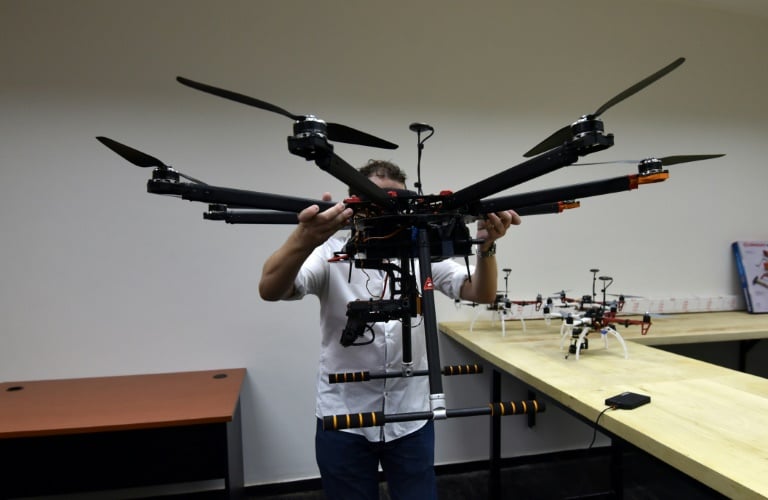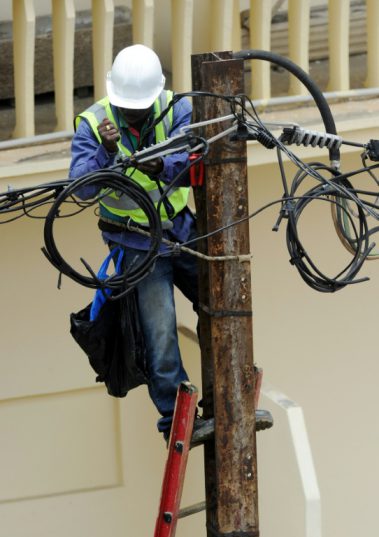"Drones have become my passion," says Noursely Doumbia, who holds a degree in electronics and is currently learning to pilot drones as part of a pioneering programme in Ivory Coast's economic capital Abidjan.
The training is being offered at a new “drone academy” which has been set up by the Ivorian Electricity Company (CIE) in order to revolutionise the inspection of its infrastructure and ultimately to reduce costs.
Although common in Europe, the use of drones is still in its infancy in West Africa although the commercial market for unmanned aircraft is expanding.
The aim is for CIE — which is majority-owned by France’s Eranove Group, a key provider of water and electricity in West Africa — to train around 20 local pilots to inspect its high-voltage lines which criss-cross the country, stretching more than 25,000 kilometres (15,500 miles).
“We have a lot of problems with vegetation, we need to clear it all the time and it’s difficult because it’s all across the whole country,” explains Benjamin Mathon, a pilot who is in charge of CIE’s drone and youth training programme.
Dirt tracks that are impassable following heavy rain, widespread areas of lush tropical vegetation and a patchy road network often conspire to make access to electricity pylons difficult in a country which covers 322,000 square kilometres (124,000 square miles) — nearly two-thirds the area of France.
After overflying an area with a drone equipped with cameras and thermal and laser sensors, “we use artificial intelligence programmes which analyse the images for any defects, a rusty bolt on a pylon, a damaged cable,” explains Mathon.
– Slashing inspection times –

Students at CIE’s academy are taught how to assemble and maintain drones as well as learning to pilot the unmanned aircraft
“The drone allows us to analyse a large number of lines in a short space of time, across great distances,” he says.
Not only do students learn how to fly drones, as well as how to assemble and repair them, but are they also trained to use different software packages for analysing the images and resulting data, as well as geolocalisation and mapping.
“This is a major technological leap forward for CIE” and its 4,500 employees, says CIE Director General Dominique Kakou.
The drones enable CIE to “to inspect our infrastructure and ensure its safety in a much more pinpointed way, and also to optimise our costs and expenses,” he says.
Before now, all inspections were done by helicopter or by teams on the ground, Mathon explains.
“Using helicopters is expensive, and on foot, you have to send out teams to areas which can be difficult to reach, which can create problems.”
– Immediate cost savings –
The financial savings are undeniable: the cost of purchasing a helicopter is around 500,000 euros, with each one hour flight costing another 1,200 euros.

Until now, inspections of Ivory Coast’s electricity network have been done by helicopter or by teams on the ground
A drone, however, costs between 2,000 and 100,000 euros to buy, its upkeep is simple and flight costs are negligible.
The company is hoping to improve its quality of service by reducing the average length of power outages — which are still relatively frequent in parts of the country — for its 1.3 million customers in Ivory Coast.
And it hopes to do the same for its customer base in neighbouring Ghana, Togo, Benin, Burkina Faso and Mali.
Since 2011, following a decade of political and military crisis, Ivory Coast has invested heavily in rebuilding its electricity grid, with the authorities planning to plough another 16 billion euros into the sector by 2030.
“The electricity sector is evolving very fast, we must adopt new technologies and innovation,” said Kakou who says the company has already invested in electronic payment schemes and solar energy.
– Window on tomorrow –
But the drone academy is not just serving the electricity sector: it is open to any business in West Africa which could benefit from the technology, from farming to mining, says Paul Ginies, director of the Centre for Electrical Professions, CIE’s training division.
“These new professions provide a way in for young people,” he says.
“I’m sure that young Africans are going to grab hold of this and surprise us by developing applications which we have not thought of. It’s their generation.”
Alice Kouadio, another trainee pilot from the first group of students, has no doubt.
“The world is a drone, it’s the promise of tomorrow.”






